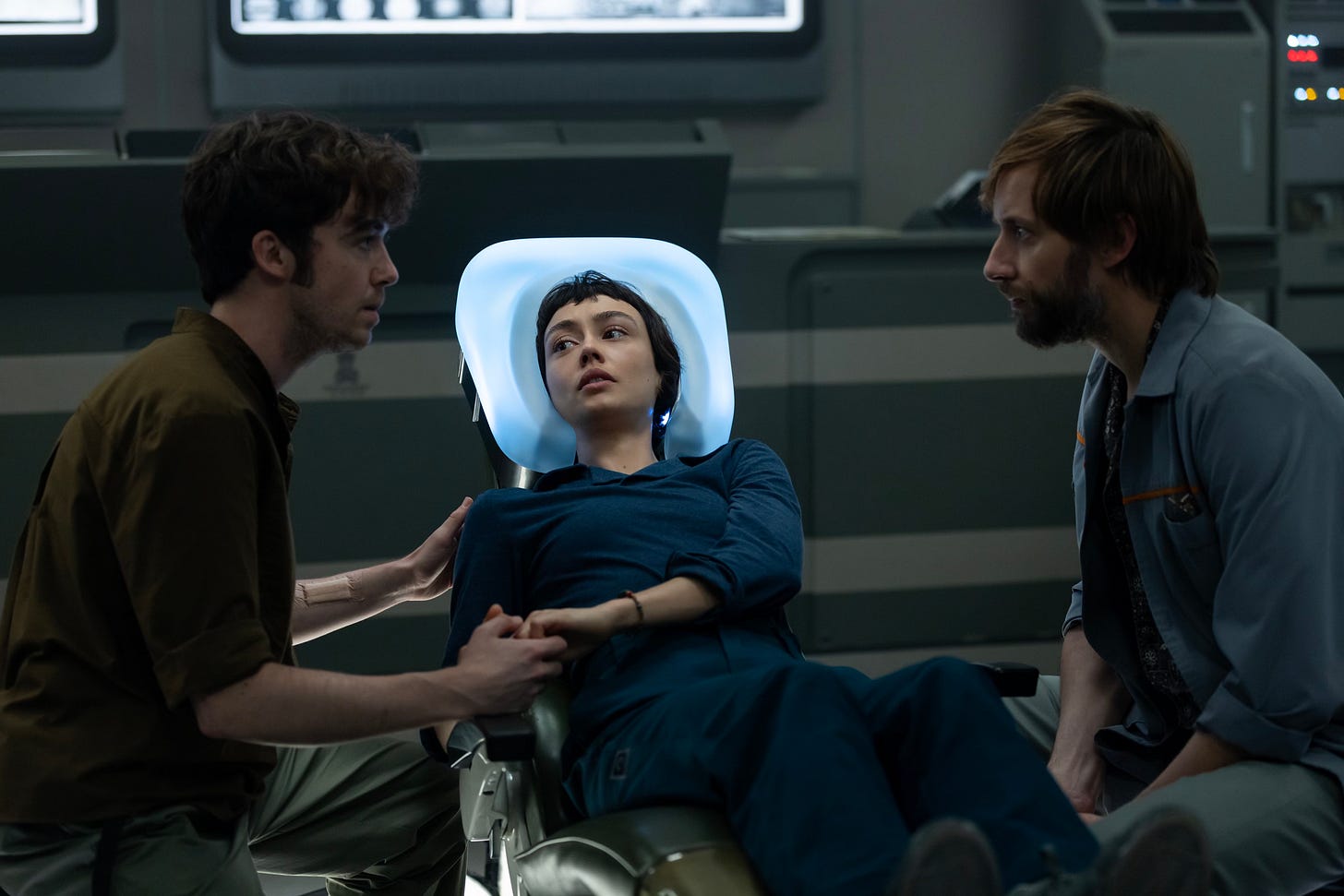‘Alien: Earth’ S1E04 Review | “Observation”
Where scientific understanding ends is where the real money is made.

[This review contains spoilers for the fourth episode of Alien: Earth, “Observation”]
As Alien: Earth reaches its halfway point, we can see a show that’s not necessarily a plot machine, but rather interested in larger thematic questions with individual episodes drilling down into particular ideas. The overarching story deals with existential matters (what makes a person a person?) as well as questions of exploitation and child welfare in the face of unrelenting capitalist desires. Last week, we saw a story about parasitic relationships beyond the typical framework of the xenomorph and its host. In this week’s episode, “Observation,” we once again return to the idea of these kids, now in adult bodies, trying to find ways to accelerate their emotional maturity, which only emphasizes how immature they truly are. More importantly, their existence at the cutting edge of science raises questions not only about their identity (are these truly the conscious minds of now-decased children, or are they merely convincing facsimiles?), but also their autonomy. We’re reminded throughout this episode that Prodigy is not in the business of scientific discovery. Prodigy is in the business of business. What’s the use in playing god if you can’t make some money off it?
When we last left Wendy, she could hear the embryo implanted inside of Hermit’s old lung. She was the only one who could hear it, and it caused her to have a bit of a mental breakdown, convulsing on the floor of the lab. As the episode begins and the team starts running hearing diagnostics on Wendy, we discover she’s not only able to somewhat interpret what she hears from the xenomorph embryo, but also reproduce the sounds, creating a rudimentary form of communication. It’s an exciting moment for Boy as he recklessly charges ahead with the next project.
One of the show’s ideas that fully crystalizes in “Observation,” is how no one here (outside maybe our reluctant lab tech Arthur) cares about the kids or the science. There is one true bond in this show–Wendy and Hermit–and we see how quickly that is exploited not in the name of science, but in the name of science that produces capital. We see this when Hermit, frustrated at his sister’s treatment, threatens to take her and leave only to be told by Boy’s right-hand man Atom that both Wendy as well as Hermit’s new lung are the property of Prodigy. It’s here that Prodigy’s interest in immortality becomes clear, as they’re not just trying to play god. If they have cracked immortality–the ability to transfer consciousness into a new body–then they also own the new bodies. That’s not extending life; that’s creating a new generation of slaves. Atom agrees to let Hermit hang around to see if Wendy is truly his sister or just a facsimile. If it’s the latter, then Atom says it’s just like a blanket with sleeves, “an invention that no one wanted.” (The creator of the Snuggie, Reginald W. Snuggie, out here catching strays)
Later in the episode, Boy makes a similarly cruel bargain with Wendy. Seeing that she now has the power to communicate with the xenomorph, he dangles keeping her brother around as incentive to play medium between species. To Atom and Boy, human relationships don’t exist to be valued, but to be exploited. It’s why Boy won’t refer to Hermit by his name but as “The Brother.” People have roles to play, but human connections are worthless. There is only the next advancement and the next leap forward. His callousness and recklessness are intertwined, and every time he opens his mouth he’s practically begging for an alien to come destroy him (I’m betting it’s the eyeball alien that gets him, a fitting end for a highly intelligent creature to wrap itself around the brain of a smug, self-satisfied genius and use him as its puppet).

All the hybrids (and Hermit) are trying to assert their independence in this episode, but capitalistic forces (under the guise of “science”) keep swatting them down. Asserting independence is a key part of growing up, but both figuratively and literally, the Lost Boys are ageless. They’ll always be at this fixed physical age, and their current attempts to act beyond their adolescent emotions only highlights their immaturity. Tootles is so proud of renaming himself “Isaac” after Isaac Newton and being a scientist, but it’s play-acting. A real scientist like Arthur knows that Prodigy isn’t doing scientific research; they’re finding ways to make money and couldn’t care less if the science is sloppy or dangerous. Nibs wants to say she’s going to be a mother, and her delusion is a coping mechanism after the eyeball alien almost burrowed itself into her brain. Slightly has been conscripted by a sociopath into a hostage situation where he’ll have to harm a person if he wants to save his family. If there is “science” here, it’s that they took a bunch of superpowered kids, traumatized them, and you won’t believe what happened next.
The strangest thing of all is it would be more ethical if they were all straight synths like Kirsh instead of hybrids. He can’t be physically or emotionally hurt, and it makes far more sense to have him working with the xenomorphs rather than sending in Wendy. But there’s no money to be made in having Kirsh take the dangerous jobs. If you want “discovery,” then there needs to be a risk, and the heads of Prodigy, Yutani, etc. didn’t get to where they were by taking the risks themselves. It may seem crazy to use the cutting-edge tech of the hybrids as if they were just lab animals, but it also speaks to a tech oligarch mindset where the only advancements worth doing are the ones that are the most dangerous. You steal fire from the gods and then ignore how that story ends.
Child exploitation is the overarching theme of Alien: Earth, but putting it through the lens of science is fascinating because we like to think of science as one of humanity’s stronger assets. “I believe in science,” is a way of asserting that you value knowledge over superstition, research over hunches. But as we know, science is not inherently benevolent, and the science being done by those in capitalist societies tends to seek a financial return for their work. There is honest science, but that can get in the way of the next advancement and the competitive edge.
If science has one advantage, it’s that its outcomes don’t inherently care about your company’s finances. Boy thinks he’s on to something with Wendy’s ability to communicate with the xenomorph, but instead, at the end of the episode we see that the creature will treat Wendy like its mother. We’ve seen so many careless faux-parents in this series from Boy to Morrow to Kirsh to Sylvia, it only stands to reason that true maturity in this world would be another twisted parent-child relationship. The key difference is that Wendy’s kid can rip you in half. How’s that for a scientific discovery?
Stray observations:
It’s interesting to see the divisions start to emerge among the Lost Boys. We have those who are investing further in Prodigy like Curly and Tootles (sorry, Isaac), and those who are starting to become disillusioned or disconnected like Wendy, Nibs, and Slightly. This all feels fairly in line with Ridley Scott’s Prometheus and Alien: Covenant in that if you are the first creation of a new species, how will you react towards your god?
I continue to like the dreamlike direction of the series. Director Ugla Hauksdóttir steps behind the camera here, and using the long dissolves similar to the original Alien only helps add to the tension and show how the characters, specifically ones at a disadvantage like Slightly, feel adrift.
I liked Kirsh’s little bit about the three wise monkeys, and how they were intended to be about avoiding evil, but now basically function as the mascots for corporate NDAs. They’re also useful in an episode called “Observation” because they emphasize how putting all your focus in one place under the auspices of science allows you to ignore all the harm you’re creating.
Alien: Earth airs Tuesday nights at 8pm ET on Hulu. Look for recaps of the latest episodes here within the next day. Matt Goldberg is a film critic who lives and works in Atlanta. If you enjoyed this review, check out his newsletter, Commentary Track.
